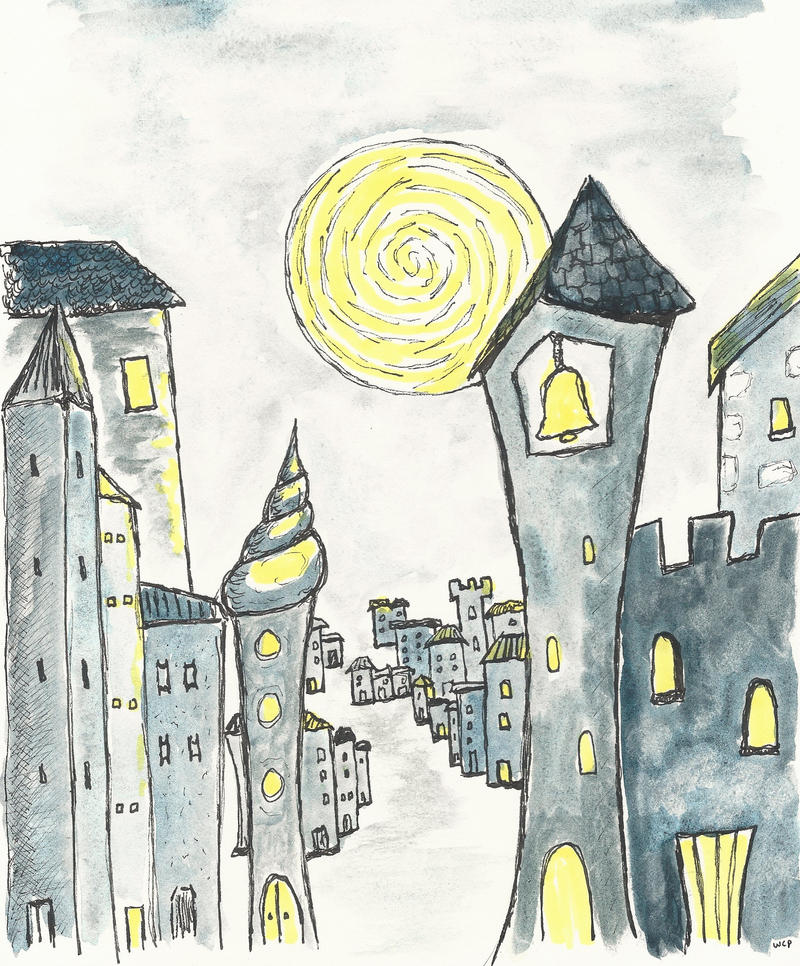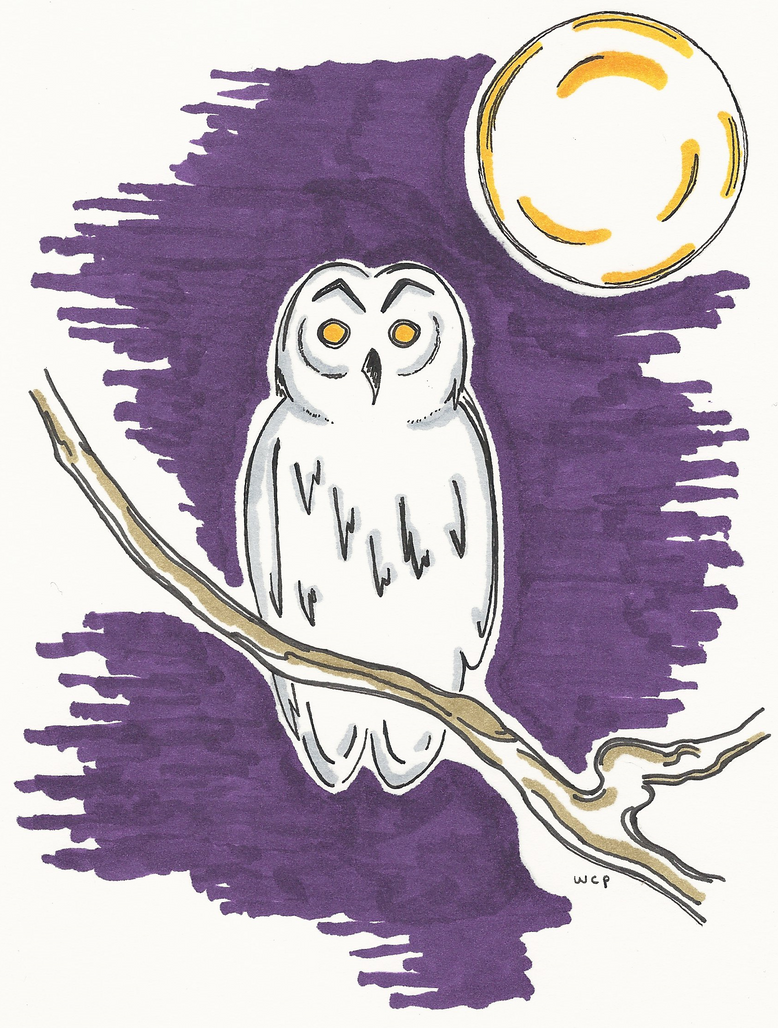Artist Interview: William C. Pfaff Artist
 Having studied at Frostburg State University, Oxford University, and being selftaught in AsianstyleCumberland's William C. Pfaff is a published author, award winning artist, and professional
Having studied at Frostburg State University, Oxford University, and being selftaught in AsianstyleCumberland's William C. Pfaff is a published author, award winning artist, and professional
brushwork, Bill brings a unique blend of styles to his creations. Acrylics, watercolors, and pen and ink are his main
tools and his works range from realistic to highly stylized to abstracts.
You used to write but said art quickly took over. What about art did you prefer over writing?
Art was much more demanding for me. I had crafted my writing skills over three decades and I still enjoy it but it doesn't quite scratch the same itch. Art is more immediate, and since I very rarely work digitally there is the thrill (and agony) of working live with no real way to revise or edit. Writing is all about revisions, art is not. They are very different animals and I still find myself enjoying both but I currently identify a bit more as an artist.
Why did you pick the style of art you do? What do you love about it?
My style varies quite a bit. I started primarily as a pen and ink artist because I just wanted to be able to illustrate, and the additional branches simply grew from that initial seed. I enjoy super realistic and detailed pen work, but then I will gravitate toward chaotic splashy and loose watercolor work. My acrylic abstracts are influenced by Mark Rothko, Franz Kline, and Jackson Pollock. I like bold statements, I like color combinations that are shocking and make people take notice. I have a lot of eastern influences in my work but I often purposely break the strict rules of that tradition to make it more "my work".
Do you think higher education for artists is important or do you think they should find a mentor? Why?
Can I go with C) None of the above? I tried to learn as much as I could in isolation for as long as I could: books, the internet, studying the masters in museums. I've never had a fine art class (a few lessons in graphic design is as close as I've come....I was a Communication major in college) and I certainly wouldn't discourage someone from a formal art education, but I also don't think it's the path for everyone. As for having a mentor? I have studied some of my close friend artists that I admire, but the key is not to steal too much. You have to make sure your vision doesn't get lost. My initial critics agreed that my work looked almost nothing like what they had seen before. That I had managed to "turn pro" without losing my amateur whimsy- I'm quite proud of that.
A lot of artists struggle with marketing their art. How do you market yours and what works best?
Marketing is one of the aspects of art I have studied the most. I give lectures and workshops on marketing and also do private art coaching, so I can't give away all my secrets. But the number one mistake I see artists make is not hustling enough. You've got to believe in your work and blow your own trumpet; otherwise no one else is going to believe in you. Talent is maybe 5 % of art, persistence is 70%, marketing is 24% and then toss in 1% luck. That may sound cynical but it's true, I have watched many incredibly talented artists (people who should be doing solo shows with regularity) never make it to their first show because they didn't believe in themselves and didn't push hard enough to make it happen. As far as what works best? I like guerrilla style marketing. Admittedly that works better in larger cities but it can still be done on a smaller scale.
What was the best advice a mentor ever gave you?
Don't ever compare yourself to anyone except yourself. Each day you only have to defeat what you've done previously. The world has already had one Monet, it doesn't need a second one- it needs the first "you".
What was the worst advice you ever received as an artist that other artists shouldn't listen to?
Not bad advice per se, but many marginally successful artists I have met give really bad advice on pricing. It goes back to the issue of valuing your work. If someone falls in love with your painting at $75 they will probably love it just the same at $90. You can only push this line of thought so far, but in general, people under charge for their hard work.
Do you have a favorite artist and why?
On a world-wide scale it's Damien Hirst and not for the reason you would think. Hirst is a modern-day P.T. Barnum, no one generates buzz like Hirst and that's why he commands the prices he does. I personally know a hundred artists better than Hirst, I've never met a better marketer. In my Western Maryland art world, Ed Coffey is head and shoulders above the rest. Ed is a master watercolor artist who understands color and contrast better than anyone I have met. He also does three-dimensional work that has set our area on fire and become one of everyone's must own items. It was an incredible departure from his watercolors and he wasn't afraid to make the leap- I really respect that kind of guts.
What advice would you give artists who tend to procrastinate or are just afraid or unsure of how to get their work out there?
The best trick I have found to overcome fear and procrastination is to tell yourself that the next piece you do will not be shown to anyone. It's practice and there is no pressure, it's for your eyes only. Nine times out of ten when you take that pressure off the piece turns out amazing and then you can choose to break your own "rule" and share it with the world.
How important do you think social media is for artists and which is your favorite platform and why?
Facebook is the current king (and my favorite just due to its popularity) but obviously Twitter, Instagram, Pinterest and others are right in the neighborhood. The key to social media is to give the people who like your work the "behind the scenes" stuff. Show what brands of paint you're using, show the thumbnails, and talk about your thought processes. Too often artists only show the finished product. Social media is a way to share more than that.
What do you think of sites like Art America and Etsy where artists can sell their work? Do you think it is a good thing or bad? Why?
I think the online art community is a great way for people to see works that they would otherwise have no chance to experience so in that sense it's a positive. I do prefer the experience that galleries and live shows provide but I'm a bit "old school" in that respect. I also think the art world is incredibly self-correcting; the cream will rise to the top. So if there is a bit of over saturation online, that problem will work itself out as online consumers become more sophisticated in their art shopping.
What projects do you have coming up in the future?
I have a major 2017 show in my hometown of Cumberland at the Gilchrist Gallery and I'm also working on illustrating some of my own writings. Even if I don't have a specific event in mind, I am always looking for the next opportunity to share my work. Pop up stores, new galleries, and conventions are always on my radar.
